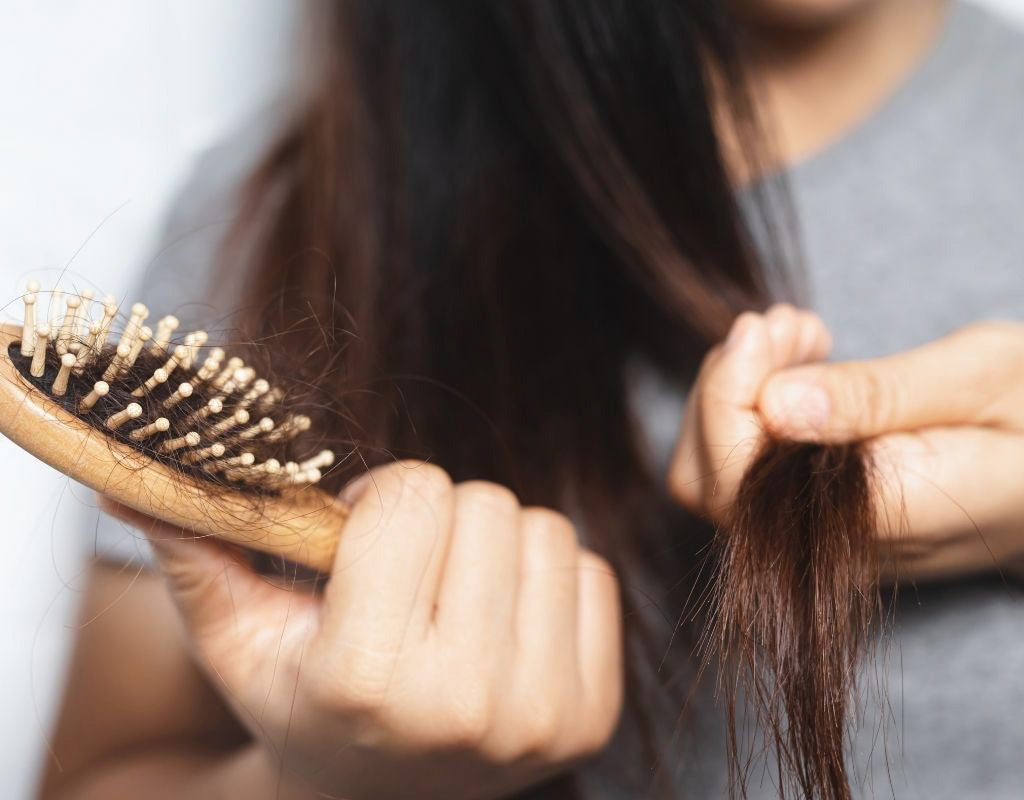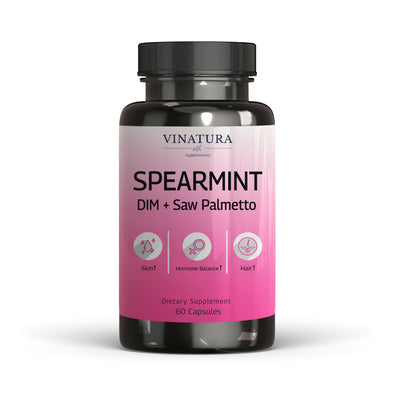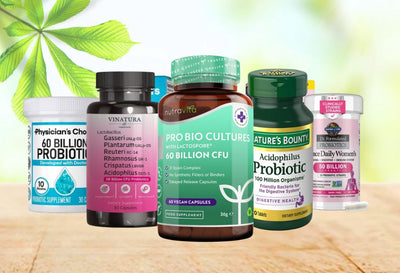
4 Benefits of Green Tea Extract for Hair & How to Use
Hair loss is a common concern that can impact confidence and overall well-being. While its causes may range from stress and nutrition to hormonal changes, many people seek natural ways to support hair and scalp health. Green tea extract, rich in plant-based compounds like EGCG, is gaining attention for its potential role in a holistic hair care routine.
In this article, we explore four science-informed ways green tea extract may contribute to hair wellness by helping maintain a healthy scalp, supporting circulation, encouraging antioxidant protection, and promoting overall hair vitality. Plus, we share how to incorporate it into your regimen safely and effectively.
Before exploring further, please read the disclaimer located at the end of this webpage.
Key Takeaways
- Green tea extract is a concentrated form of nutrients found in green tea rich in antioxidants like EGCG
- It is widely used in supplements and skincare for its anti-inflammatory and protective properties
- Modern extraction methods help preserve and enhance the potency of its active compounds
- Its nutrients like catechins caffeine and vitamins may support scalp vitality and healthier looking hair
Green Tea Extract Introduction
Green tea, derived from the Camellia sinensis plant, is a beloved beverage enjoyed worldwide, second only to water in popularity [1].
Green tea extract is a concentrated form of these beneficial components, widely used in supplements and cosmetics for its rich bioactive profile [13]. It has even gained recognition in dermatology, with an EGCG-rich ointment approved by the FDA and EMA for certain skin conditions, marking a breakthrough for plant-based remedies [9].

The extract is created by steaming and drying green tea leaves post-harvest to halt fermentation, followed by ethanol extraction.
In this process, the leaves are soaked in 70% ethanol and concentrated over days into a viscous, potent solution [10]. Advanced formulations, such as microemulsions with nanoparticles (10-100 nm)—enhance absorption of its active compounds [6].
Among these compounds, polyphenols dominate, especially catechins like EGCG (epigallocatechin gallate)—a powerful antioxidant that makes up to 65% of total catechins and is known for its anti-inflammatory and cell-protective effects [1,2,5].
Beyond catechins, the extract contains caffeine, theanine, amino acids, vitamins B, C, and E, minerals (potassium, magnesium), and compounds like quercetin and chlorophyll [2,5,8].
Thanks to its antioxidant-rich profile, green tea extract helps combat oxidative stress, supports skin and cardiovascular health, aids weight management, improves circulation, and possesses antimicrobial properties [5,13,9].
These benefits extend to hair health, where studies suggest it may support scalp vitality and contribute to fuller-looking hair [8,13].
Benefits of Green Tea Extract for Hair

May help reduce hair shedding
Hair loss affects over 50 million Americans, including 20 million women [8]. A primary culprit is DHT (dihydrotestosterone), a hormone that shortens the hair growth phase and weakens follicles [2,13].
Green tea extract may help reduce shedding by:
- Inhibiting 5α-reductase, the enzyme that converts testosterone to DHT [2,13].
- Supporting dermal papilla cell growth and reducing inflammation [3,6].
- Creating a balanced scalp environment that supports hair retention [4].
In a 2005 study, 33% of mice with spontaneous hair loss showed signs of hair regrowth after consuming green tea extract for six months [11].
However, these results are limited to animal models and may not apply to humans. Another study in 2007 showed EGCG increased hair follicle length and growth factor expression in human follicle cultures [3].
Real-life reports, such as from Reddit users, suggest reduced hair shedding after green tea use—though anecdotal, they reflect increasing interest in natural solutions.*
Supports hair growth
By supporting hormonal balance and follicular activity, green tea extract may promote longer-lasting, healthier hair. EGCG has been shown to extend the anagen (growth) phase and increase follicle length in lab studies [2,3].
A 2019 animal study found that a 7.5% green tea microemulsion showed similar hair-supporting effects to 2.5% minoxidil in mice [6], though these findings may not translate directly to humans.
Real-world insights echo these findings. TikTok user life_ledger shared a hair growth spray recipe using green tea, fermented rice water, and rosemary, reflecting growing interest in natural hair care solutions.*
These findings suggest that green tea extract not only supports scalp and hair health but may also enhance nutrient delivery to hair follicles.
Scalp Health Improvement
Green tea extract also improves scalp condition by:
- Reducing excess sebum, which helps manage oily scalps prone to dandruff [4].
- Calming inflammation and soothing irritation—beneficial for sensitive skin [13].
- Enhancing scalp microcirculation, improving nutrient delivery to follicles [13].
In a 2016 clinical trial, a 2% green tea toner reduced scalp oil significantly within 21–28 days [4]. A separate study showed green tea polyphenols improved skin blood flow within 30 minutes of ingestion [13].
Together, these effects create a healthier environment for strong, resilient hair, further supported by the extract’s rich nutritional profile. Beyond scalp-level improvements, green tea extract also provides essential nutrients that may benefit hair health from within.
Improved nutrient delivery
Green tea is also packed with essential vitamins like B, C, and E, along with minerals such as calcium, magnesium, zinc, and potassium [8].
While the exact mechanism of how these nutrients reach the follicles remains unclear, the combination of improved circulation and this nutrient-rich profile may help support healthy, resilient hair growth.
Improved circulation also helps deliver these nutrients more efficiently, while caffeine—also present in green tea—may further stimulate blood flow to hair roots [13].
Although the precise mechanisms for nutrient uptake in hair are still being studied, these combined effects suggest a supportive role for green tea extract in long-term hair health.

Who Should Use Green Tea Extract for Hair?
Green tea extract is suitable for both men and women dealing with:
- Hair thinning or loss related to DHT
- Stress-related shedding or inflammation
- Oily, dandruff-prone scalps
- Sensitivity to harsher hair care ingredients
It’s especially appealing for those seeking a natural alternative to synthetic treatments like minoxidil.
How to Use Green Tea Extract for Hair Growth

Topical Use
Topical products such as shampoos, conditioners, toners, or hair masks can deliver active compounds directly to the scalp.
Usage tips:
- Apply products with 1–4% green tea extract twice daily (e.g., 5 drops of toner).
- Results may be seen after 3–4 weeks of consistent use [4].
- Microemulsion formulas enhance absorption and are generally non-irritating [6].
User note: According to discussions on Reddit, some users have noticed reduced hair shedding after incorporating weekly green tea rinses into their conditioning routines.*

Oral Use
Green tea extract can also be consumed in capsule, powder, or brewed tea form, supporting systemic health and circulation.
Advantages: Oral green tea delivers systemic benefits, with active compounds circulating through the bloodstream to support hair and overall health [7,13].
It’s convenient, whether consumed as brewed tea or supplements, and green tea has a long history of safe use with no significant side effects at standard doses (NOAEL: 2000 mg/kg/day for catechins in animal studies) [1,5].
Disadvantages: The concentration of active compounds reaching the scalp may be lower compared to topical applications, as in vitro studies often use higher doses than achievable through oral intake [9].
Human clinical evidence for hair-specific benefits remains limited, with most data from animal or in vitro studies, requiring further research [13]. Those sensitive to caffeine should opt for decaffeinated options [5,7].

Usage Guidelines:
Capsules or Powders: A study used 300 mg green tea extract twice daily to support skin health, suggesting a similar approach for hair benefits [13]. Doses up to 800 mg EGCG daily showed no adverse blood test changes [7]. Take as directed on the supplement label, typically with meals.
Brewed Tea: Drinking green tea daily provides catechins, but their potency depends on careful preparation to preserve bioactivity, as they’re sensitive to light and oxygen [13]. Use fresh, high-quality tea and steep properly to maximize benefits.
This internal approach complements topical use, offering a comprehensive strategy to support hair health, while the next section explores potential risks and side effects to consider.
Green Tea Extract for Hair: Risks and Side Effects You Should Know

Green tea extract—when used topically or as part of a wellness routine—may support hair and scalp health based on early evidence. However, it’s important to understand the potential risks to use it safely.
Topical Use (on the scalp): Green tea shampoos, serums, and tonics are generally safe and gentle, with studies showing little to no skin irritation [6,8]. However, many commercial products don’t clearly list their ingredient amounts, and strong clinical evidence in humans is still limited [13].
Some studies, especially on oil (sebum) reduction, were small or tested only on men, making the results less reliable [13]. Also, green tea catechins may not absorb well through the skin—though microemulsion formulas can improve this [13].
Oral Use (drinking or supplements): Green tea is widely used and generally safe, with studies showing high tolerance in animals at large doses [1,5]. Still, consuming too much can lead to side effects like jitteriness, stomach discomfort, or sleep issues due to caffeine [2].
If you're sensitive to caffeine, choose decaf versions. Pregnant or breastfeeding women should also limit their intake [1,2]. Very high doses of EGCG (over 1500 mg/kg/day in animal studies) may affect the liver, but typical use is far below this [5].
The recommended safe daily limit for EGCG is around 338 mg for adults [5]. Overuse might also reduce folate levels, lower calcium absorption (affecting bones), or in rare cases, interact with medications like warfarin [2,7]. Some people may also experience tooth staining from green tea’s polyphenols, or be concerned about fluoride levels [1,2].
Lastly, while results in animals and labs are promising, solid human studies on green tea’s benefits for hair remain limited [13,9]. Used wisely, green tea extract is a promising hair care ally.
Other Tea Extracts Benefit for Your Hair
While green tea extract remains the most researched, it's helpful to briefly explore whether other teas from the Camellia sinensis plant such as black, white, oolong, and yellow tea might offer similar hair benefits.
These teas undergo more extensive processing, including oxidation or fermentation, which significantly reduces their catechin content. Catechins are compounds believed to support scalp and hair health [2,13].
For instance, black tea is fully fermented, altering its natural phytochemicals and potentially diminishing its effectiveness for hair-related purposes [2].
So far, few studies have explored how these teas affect hair. One experiment showed that tea extracts, when combined with oxidizing agents, could dye gray hair brown—similar in color and durability to commercial hair dyes [12]. However, this study focused only on hair coloring and didn’t examine hair growth or other benefits.
In short, while teas like black, white, or oolong may offer some potential, we still need more scientific evidence to understand how they truly affect hair. Future research may uncover new uses for these lesser-known teas in natural hair care.
Conclusion
Green tea extract emerges as a natural, well-researched option for supporting scalp health, promoting hair vitality, improving scalp condition, and enhancing nutrient delivery. While early findings are promising, more human studies are needed.
Available in both topical and oral forms, it offers versatility, with EGCG as the standout compound. While other teas show some promise, green tea remains the most studied. However, due to limited human trials and potential risks at high doses, it’s best used in moderation and with professional guidance.
Testimonial Disclaimer
*The testimonials presented on this website are provided by individuals based on their personal experiences with our products. These testimonials represent individual opinions and experiences, which may not be typical or applicable to all users of our products. Results may vary depending on a variety of factors, including individual health, lifestyle, and adherence to product usage instructions.References
- [1] Sinija, V. R., and H. N. Mishra. “Green Tea: Health Benefits.” Journal of Nutritional & Environmental Medicine, vol. 17, no. 4, Jan. 2008, pp. 232–242, https://doi.org/10.1080/13590840802518785.
- [2] Musial, Claudia, et al. “Beneficial Properties of Green Tea Catechins.” International Journal of Molecular Sciences, vol. 21, no. 5, 4 Mar. 2020, p. 1744, www.ncbi.nlm.nih.gov/pmc/articles/PMC7084675/, https://doi.org/10.3390/ijms21051744.
- [3] Kwon, O.S., et al. “Human Hair Growth Enhancement in Vitro by Green Tea Epigallocatechin-3-Gallate (EGCG).” Phytomedicine, vol. 14, no. 7-8, Aug. 2007, pp. 551–555, https://doi.org/10.1016/j.phymed.2006.09.009.
- [4] Nualsri, Chanchanok, et al. “Development and Clinical Evaluation of Green Tea Hair Tonic for Greasy Scalp Treatment.” Journal of Cosmetic Science.., vol. 67, no. 3, 2016, pp. 161–66, pubmed.ncbi.nlm.nih.gov/29394016/.
- [5] Zhao, Tiantian, et al. “Green Tea (Camellia Sinensis): A Review of Its Phytochemistry, Pharmacology, and Toxicology.” Molecules, vol. 27, no. 12, 18 June 2022, p. 3909, https://doi.org/10.3390/molecules27123909.
- [6] Amin, Juheini, et al. “Green Tea [Camellia Sinensis (L.) Kuntze] Leaves Extract and Hibiscus (Hibiscus Tilliaceus L.) Leaves Extract as Topical Hair Growth Promoter in Microemulsion.” Agriculture and Natural Resources, vol. 53, no. 2, 2019, pp. 139–147, li01.tci-thaijo.org/index.php/anres/article/view/229911.
- [7] Pastore, Robert L., and Patrick Fratellone. “Potential Health Benefits of Green Tea (Camellia Sinensis): A Narrative Review.” EXPLORE, vol. 2, no. 6, Nov. 2006, pp. 531–539, https://doi.org/10.1016/j.explore.2006.08.008.
- [8] Nursiyah, Nursiyah, et al. “HAIR GROWTH ACTIVITY TEST of HAIR TONIC THAT CONTAINS GREEN TEA LEAF EXTRACT, CELERY LEAF EXTRACT and COMBINATION of GREEN TEA LEAF and CELERY LEAF EXTRACT - Repository Universitas Nahdlatul Ulama Sunan Giri Bojonegoro.” Unugiri.ac.id, 2021, repository.unugiri.ac.id:8443/id/eprint/2571.
- [9] Zink, Alexander, and Claudia Traidl-Hoffmann. “Green Tea in Dermatology - Myths and Facts.” JDDG: Journal Der Deutschen Dermatologischen Gesellschaft, vol. 13, no. 8, 14 July 2015, pp. 768–775, https://doi.org/10.1111/ddg.12737.
- [10] Noviani, Vini, et al. “Hair Growth Promoting Activity of Green Tea Leaves (Camellia Sinensis L.) Ethanolic Extract.” Majalah Obat Tradisional, vol. 24, no. 2, 16 July 2019, p. 104, https://doi.org/10.22146/mot.44053. Accessed 10 Dec. 2019.
- [11] Esfandiari, Adeleh, and A Paul Kelly. “The Effects of Tea Polyphenolic Compounds on Hair Loss among Rodents.” Journal of the National Medical Association, vol. 97, no. 8, Aug. 2005, p. 1165, pmc.ncbi.nlm.nih.gov/articles/PMC2576011/. Accessed 1 July 2025.
- [12] Roes Lie, Indra Syahputra, et al. “GREEN TEA EXTRACT in an EYELASH GROWTH ENHANCER GEL FORMULATION: STABILITY TEST, EYE IRRITATION TEST, and HUMAN EYELASH GROWTH ACTIVITY.” Asian Journal of Pharmaceutical and Clinical Research, vol. 10, no. 6, 1 June 2017, p. 243, https://doi.org/10.22159/ajpcr.2017.v10i6.18605. Accessed 2 Dec. 2021.
- [13] Koch, Wojciech, et al. “Applications of Tea (Camellia Sinensis) and Its Active Constituents in Cosmetics.” Molecules, vol. 24, no. 23, 24 Nov. 2019, p. 4277, https://doi.org/10.3390/molecules24234277.
Author

Product Disclaimer
The dietary supplement products mentioned on this website are formulated based on scientific research and adhere to FDA guidelines for dietary supplements. However, the content of the articles has not been evaluated by the Food and Drug Administration (FDA) and is not intended to promote or endorse any specific product. Any products sold on this website are not intended to diagnose, treat, cure, or prevent any disease.
Opinions and Endorsements
Any claims, statements, or opinions expressed in the articles are those of the author(s) and do not necessarily reflect the views or opinions of the manufacturers of the dietary supplement products. The products sold on this website are separate from the content of the articles and are not directly endorsed or associated with the information presented here.
Liability Disclaimer
The author(s) of the articles, website, and manufacturers of the dietary supplement products do not assume any liability for any potential consequences arising from the use of the information provided in the articles. It is recommended that individuals consult with a qualified healthcare professional before making any dietary or lifestyle changes, including the use of dietary supplements.
Product Usage
Please refer to the product labels and packaging for specific usage instructions and guidelines for the dietary supplement products sold on this website.
Customer Support
For any concerns or questions regarding the dietary supplement products, please contact our customer support team, who will be more than happy to assist you.





Leave a Comment
Be the first to comment.
What do you think?